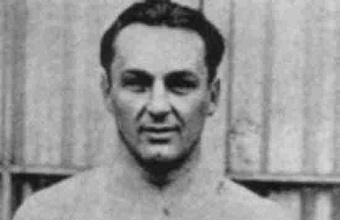The Wrestling Legacy and Mysterious Demise of Joe Stecher: A Pioneer Remembered
In the annals of professional wrestling history, Joe Stecher’s name stands as a testament to the early days of the sport’s evolution and the dedicated athletes who laid its foundation. Born on April 4, 1893, in Dodge, Nebraska, Joe Stecher’s career not only showcased his exceptional wrestling prowess but also left an indelible mark on the sport’s development. While his contributions to wrestling remain celebrated, his untimely death continues to be shrouded in mystery.
Joe Stecher’s journey into wrestling began at a young age when he showcased a natural aptitude for physical activities. He quickly developed a reputation for his strength and agility, catching the attention of local wrestling promoters. Stecher made his professional debut in 1910 at the age of 17, showcasing a raw talent that would later blossom into greatness. His early matches demonstrated a unique blend of technique, strength, and athleticism that set him apart from his contemporaries.
Stecher’s breakthrough moment came in 1915 when he faced the reigning World Heavyweight Wrestling Champion, Charlie Cutler. Despite being the underdog, Stecher displayed incredible resilience and strategy, defeating Cutler and securing his first world title. This victory marked the beginning of Stecher’s domination of the wrestling scene, as he embarked on a reign that would see him become one of the most iconic champions of his era.
Known for his signature move, the “Stecher Scissors,” Joe Stecher had a style that combined scientific wrestling with raw power. His grappling skills were unparalleled, and he possessed an uncanny ability to outmaneuver and outthink his opponents. Stecher’s championship reigns were marked by numerous successful defenses against formidable challengers, solidifying his reputation as a true wrestling virtuoso.
Stecher’s impact extended beyond the mat as he helped shape the perception of professional wrestling as a legitimate sport. During an era when the lines between sport and spectacle were often blurred, he advocated for clean, honest competition and brought a sense of integrity to the wrestling world. His dedication to his craft earned him the respect of fans and fellow wrestlers alike.
The pinnacle of Stecher’s career came in 1920 when he faced the renowned Ed “Strangler” Lewis in a series of matches that would become legendary. Their encounters captivated audiences and showcased the technical brilliance of both wrestlers. Ultimately, Lewis managed to dethrone Stecher, ending his historic championship reign. However, Stecher’s legacy was already firmly established, and his influence continued to shape the trajectory of professional wrestling.
Despite his illustrious career, Joe Stecher’s life took a tragic turn in 1974 when he passed away at the age of 81. His death, however, remains shrouded in mystery and controversy. Conflicting reports and limited information surround the circumstances of his demise, leaving fans and historians to speculate about the true events leading up to that fateful day.
One prevailing theory is that Stecher’s death resulted from complications related to Parkinson’s disease, a condition he had been battling for years. Another theory suggests that his passing was connected to a car accident he had been involved in shortly before his death. The lack of concrete information has contributed to an air of uncertainty surrounding the end of Joe Stecher’s life, leaving his legacy tinged with an enigmatic quality.
Joe Stecher’s impact on professional wrestling endures through the generations. His technical mastery and dedication to the sport laid the groundwork for future wrestling champions and inspired the evolution of wrestling techniques. He embodied the spirit of a true athlete, demonstrating that success in wrestling required not only physical prowess but also intelligence and strategy.
In tribute to his contributions, Joe Stecher was posthumously inducted into the George Tragos/Lou Thesz Professional Wrestling Hall of Fame in 2000, cementing his place among the pantheon of wrestling legends. His name remains synonymous with excellence in wrestling and serves as a reminder of the sport’s rich history.
While the details of Joe Stecher’s death may remain uncertain, his impact on the world of professional wrestling is undeniable. He was a trailblazer, a champion, and a symbol of the dedication and passion that define the sport. As fans and historians continue to explore the legacy of Joe Stecher, they honor not only a remarkable athlete but also a key figure in the story of professional wrestling’s evolution.
